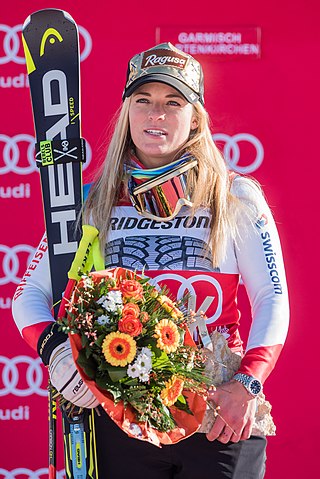
The International Ski Federation (FIS) Alpine Ski World Cup was the premier circuit for alpine skiing competition. The inaugural season launched in January 1967, and the 2018–19 season marks the 53rd consecutive year for the FIS World Cup.

The International Ski Federation (FIS) Alpine Ski World Cup, the premier circuit for alpine skiing competition, began in January 1967, and the 2019–20 season marked the 54th consecutive year for the FIS World Cup. As it had every year since 2006, the season began in Sölden, Austria in October. The season was supposed to end with the World Cup finals in March, which were to be held in Cortina d'Ampezzo, Italy for the first time since they began in 1993, but the finals were cancelled due to the COVID-19 outbreak in Italy.

The men's super-G in the 2021 FIS Alpine Skiing World Cup consisted of six events, although seven had been originally scheduled.

The men's downhill in the 2020 FIS Alpine Skiing World Cup consisted of nine events, with only one cancellation from the scheduled ten.

The men's downhill in the 2022 FIS Alpine Skiing World Cup included eleven events including the final. A scheduled downhill on 5 December 2021 at Beaver Creek, Colorado was cancelled due to bad weather, but after several abortive attempts to run it at other venues, it was finally added to Kvitfjell on March 4, the day before the previously-scheduled race.

The men's super-G in the 2022 FIS Alpine Skiing World Cup consisted of seven events including the final. A race originally scheduled for Lake Louise in November and then rescheduled to Bormio in December was cancelled twice and was thought unlikely to be rescheduled, potentially reducing the season to six events. However, the race was rescheduled to Wengen on 13 January 2022. After this race, 2016 champion Aleksander Aamodt Kilde of Norway had won three of the five completed races and led the discipline; two other races were within 100 points of his lead, although no one was closer than 60 points behind. Kilde then clinched the discipline championship for the season in front of a home crowd by winning the next-to-last race of the season in Kvitfjell.

The International Ski Federation (FIS) Alpine Ski World Cup was the premier circuit for alpine skiing competition. The inaugural season launched in January 1967, and the 2022–23 season marks the 57th consecutive year for the FIS World Cup.

The women's downhill in the 2023 FIS Alpine Skiing World Cup consisted of nine events, including the final. The original schedule called for eleven events, but the first two races of the season scheduled for 5 and 6 November 2022 in Zermatt/Cervinia, were canceled due to adverse weather conditions; the FIS decided not to reschedule them. Once the season began, a downhill scheduled in St. Anton on 14 January had to be converted into a Super-G due to the inability to hold a pre-race training run on either of the two days prior to the downhill. However, a subsequent Super-G scheduled at Cortina d'Ampezzo was converted into a downhill, restoring the original schedule.

The women's super-G in the 2023 FIS Alpine Skiing World Cup included eight events, including the final. The original schedule called for nine events, but a scheduled downhill at St. Anton on 14 January was converted to a super-G due to the inability to hold pre-race practice runs on either of the two days prior to the event. A later super-G at Cortina was converted into a downhill to restore the original schedule balance, but then a downhill at Crans Montana on 25 February had to be delayed a day due to fog and dangerous course conditions, and the super-G previously scheduled for that day was cancelled and not rescheduled.

The men's downhill in the 2019 FIS Alpine Skiing World Cup involved eight events. Swiss skier Beat Feuz won his second consecutive season title in this discipline.

The men's super-G in the 2023 Alpine Skiing World Cup consisted of eight events, including the final. The season was originally planned with eight races, but two were cancelled early in the season and were not planned to be rescheduled. However, when two races planned at Garmisch-Partenkirchen on 28-29 January 2023 were cancelled due to a lack of snow, the two previously-cancelled Super-G races were rescheduled on those dates at Cortina d'Ampezzo, restoring the original Super-G schedule plan.

The men's giant slalom in the 2023 FIS Alpine Skiing World Cup consisted of ten events including the final. Defending discipline champion Marco Odermatt of Switzerland opened over a 100-point lead in the discipline by winning four of the first five races and finishing third in the other, although he then missed a race due to injury. Odermatt clinched the discipline championship by winning both giant slaloms on 11-12 March in Kranjska Gora, Slovenia.

The women's downhill in the 2019 FIS Alpine Skiing World Cup involved eight events, including the season finals in Soldeu, Andorra. Defending discipline champion Sofia Goggia of Italy fractured her ankle prior to the start of the season and missed five of the eight events, ending her chances to repeat. In addition, 2018 runner-up Lindsey Vonn of the USA, who had closed the prior season by winning all of the final four downhills and needed only four more victories to equal Ingemar Stenmark's all-time World Cup victory record, began the season injured and announced her planned retirement at the end of the season, but was hampered during her comeback by her cumulative injuries, and finally retired immediately after the conclusion of the 2019 World Ski Championships.

The women's super-G in the 2019 FIS Alpine Skiing World Cup involved 6 events, including the finals in Soldeu, Andorra. Originally, the season had been planned to hold 8 events, but the two races scheduled in Sochi, Russia were cancelled due to continuing heavy snowfall.

The women's giant slalom in the 2019 FIS Alpine Skiing World Cup involved 8 events.

The men's super-G in the 2018 FIS Alpine Skiing World Cup involved six events including the final in Åre, Sweden. Norwegian skier Kjetil Jansrud, the defending champion in the discipline, won two of the first five races and finished second in two more, clinching the crystal globe for the season before the final.

The men's super-G in the 2017 Alpine Skiing World Cup involved six events, including the finals in Aspen, Colorado (USA). Although Norwegian skier Aleksander Aamodt Kilde was the defending champion in the discipline, fellow Norwegian Kjetil Jansrud won the first three Super-G races of the season. With only six events in the discipline, Jansrud then clinched the season championship before the finals merely by finishing seventh in the fifth Super-G of the year in Kvitfjell, Norway.

The women's super-G competition in the 2016 FIS Alpine Skiing World Cup involved sight events, including the season final in St. Moritz, Switzerland.

The men's downhill competition in the 2016 FIS Alpine Skiing World Cup involved eleven events, including the season finale in St. Moritz, Switzerland.

The men's super-G competition in the 2016 FIS Alpine Skiing World Cup involved eight events, including the finals in St. Moritz, Switzerland.













